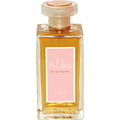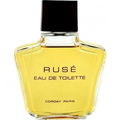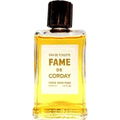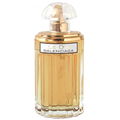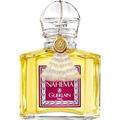
Turandot
841 Reviews
Translated · Show original

Turandot
Top Review
18
W.A.MOZART / FAGOTTKONZERT B- DUR KV 191
Rusé clearly belongs to the perfumes where everyone experiences something different, and every classification reveals more about the person smelling it than about the scent itself. This is evident from the variety in the pie chart. With a bit of goodwill, I can understand everything other members have chosen for categories besides "sweet" and "smoky."
Now, a fragrance that has something for everyone quickly falls under suspicion of being arbitrary, but Rusé is by no means that. On the contrary, the scent has a pronounced, unmistakable character, exudes dark elegance, and reminds me of no perfume I have ever smelled before. Identifying notes here is simply not possible. The most I could do is list what is definitely not in it, such as patchouli or fruity notes.
Rusé also does not remind me of a forest walk like Florblanca does, not even in the top notes. The atmosphere that the perfume spreads is not naturalistic enough for that. Here, floral elements are more suggested than replicated. At first, I don't see any images; instead, Rusé reminds me of music where oboes or a bassoon play the main role. This also explains my title, as that was the hardest part of this comment for me.
The unsweet, but actually not really harsh character of Rusé fascinates me as well. And I can very much relate to the comparison with dark satin. Despite its opulence, the heart note of the perfume feels smooth and cool and truly dark to me. Classifying the scent as "woody" and "resinous" is accurate, but it sounds rougher than it really is. Here, I once again regret that we don't have the option to choose "mossy" in our classification, although that would sound mustier than Rusé presents itself.
You can see, this scent is not easily grasped, and that is precisely what excites me about a perfume. The base also does not develop as I expected, or as one is used to with many fragrances - softer, sweeter, woodier, more animalic - none of that is true, as Rusé does not change its character until the very end, becoming at most a bit more tender, but fading away like an echo of itself and remaining intriguing until the last moment. This tension, which makes it impossible to break the perfume down into top, heart, and base notes, or to pin down the individual stages, is what excites me so much. And while I am very cautious with the term "work of art" in connection with perfumes - what has been created by human hands here commands my admiration without question. Thank you for allowing me to encounter Rusé!
The only downside might be the name, as I find no correspondence in the scent for cunning or clever. "Rusé" sounds phonetically fitting, and what it means ultimately doesn't matter to me.
In connection with the scent, I again ponder whether it even makes sense to comment on a fragrance that hardly anyone has the chance to get to know, let alone acquire. But it would be a shame if perfumes like Rusé were to disappear without a trace and thus something like a cultural asset were lost.
Now, a fragrance that has something for everyone quickly falls under suspicion of being arbitrary, but Rusé is by no means that. On the contrary, the scent has a pronounced, unmistakable character, exudes dark elegance, and reminds me of no perfume I have ever smelled before. Identifying notes here is simply not possible. The most I could do is list what is definitely not in it, such as patchouli or fruity notes.
Rusé also does not remind me of a forest walk like Florblanca does, not even in the top notes. The atmosphere that the perfume spreads is not naturalistic enough for that. Here, floral elements are more suggested than replicated. At first, I don't see any images; instead, Rusé reminds me of music where oboes or a bassoon play the main role. This also explains my title, as that was the hardest part of this comment for me.
The unsweet, but actually not really harsh character of Rusé fascinates me as well. And I can very much relate to the comparison with dark satin. Despite its opulence, the heart note of the perfume feels smooth and cool and truly dark to me. Classifying the scent as "woody" and "resinous" is accurate, but it sounds rougher than it really is. Here, I once again regret that we don't have the option to choose "mossy" in our classification, although that would sound mustier than Rusé presents itself.
You can see, this scent is not easily grasped, and that is precisely what excites me about a perfume. The base also does not develop as I expected, or as one is used to with many fragrances - softer, sweeter, woodier, more animalic - none of that is true, as Rusé does not change its character until the very end, becoming at most a bit more tender, but fading away like an echo of itself and remaining intriguing until the last moment. This tension, which makes it impossible to break the perfume down into top, heart, and base notes, or to pin down the individual stages, is what excites me so much. And while I am very cautious with the term "work of art" in connection with perfumes - what has been created by human hands here commands my admiration without question. Thank you for allowing me to encounter Rusé!
The only downside might be the name, as I find no correspondence in the scent for cunning or clever. "Rusé" sounds phonetically fitting, and what it means ultimately doesn't matter to me.
In connection with the scent, I again ponder whether it even makes sense to comment on a fragrance that hardly anyone has the chance to get to know, let alone acquire. But it would be a shame if perfumes like Rusé were to disappear without a trace and thus something like a cultural asset were lost.
12 Comments






